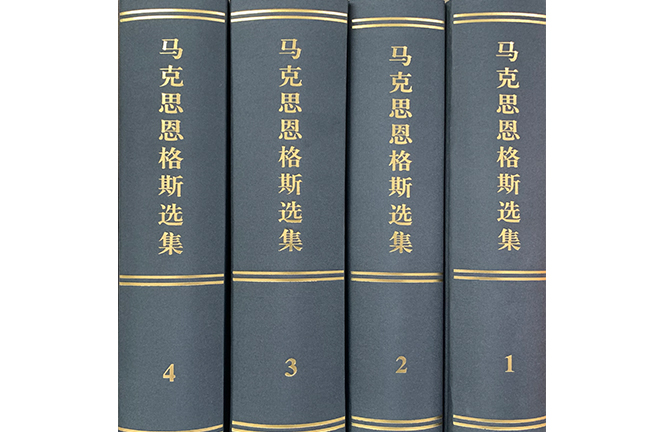Choosing the path to innovate Marxism

Collected Works of Marx and Engels (Chinese edition) Photo: Zhao Yuan/CSST
The vitality of theory lies in continuous innovation. Throughout the century of the Communist Party of China (CPC)’s theoretical exploration, Marxism’s theoretical forms, epochal themes, and discourse expressions have always developed alongside history, showing the theoretical quality of Marxism adapted to the Chinese context, which comes down in one continuous line and advances with the times.
Responding to epochal tasks
The adherence to emancipating the mind is the source of Marxism’s innovative development. Thought guides action. Further adapting Marxism to the Chinese context requires emancipated minds to analyze and research real problems arising from our times. In the new era, to further innovate and develop Marxism we must advance with time, renew ideas, carry forward the scientific spirit, transform thinking modes, and dive into the great practice of socialism with Chinese characteristics. History and practice continue to prove that Marxism adapted to the Chinese context shows the strength of truth in China. Only by adhering to our own path to build socialism with Chinese characteristics, can our development remain on track to create greater Chinese miracles in the new era.
The pathway of innovative development in Marxism upholds the principle of seeking truth from facts. Over the past 100 years, Chinese communists have proceeded from reality, integrating theory with practice, correctly understanding China’s current national conditions, and correctly applying Marxism to guide practice. Historical materialism contends that history is dynamic rather than static. This requires Chinese communists to approach China’s ever-changing national conditions concretely and historically and make specific analyses according to the specific problems and historical characteristics of each development stage. Dialectical materialism holds that nothing exists in isolation, as everything is generally connected. This underlies the overall system of dynamic development, which provides important methodological guidance for the correct understanding and analysis of China’s national conditions. In the process of adapting Marxism to the Chinese context, each theoretical innovation achievement is a profound answer to the major questions faced in our times and responds to the needs of practical development. Innovation is achieved by discovering, screening, analyzing, and addressing the major epochal tasks confronted by human society.
Marxism’s innovative development requires taking specific practices of different historical periods as the foundation, establishing different theoretical themes and research categories in different spatial and temporal conditions, and constantly exploring new ways to resolve contradictions and problems.
The adherence to consolidating the basis is the root of Marxism’s innovative development. When the root is deep, the leaves are luxuriant. The root of Marxism adapted to the Chinese context is the basic principle of Marxism founded and developed by classical Marxist writers. The basic principles of Marxism occupy the core of Marxist theoretical systems and determine the fundamental direction of the whole scientific system. History has proved that if we deviate from the basic principles of Marxism, theoretical innovation will become a tree without roots. Marxism is constantly growing and has great vitality in 21st century China. China has developed rapidly under the guidance of Marxism, which shows the ideological wisdom, theoretical strength, and epochal significance of Marxism in the 21st century. Although our times have changed profoundly compared with Marx’s, we are still in the “era of transition from capitalism to socialism” as indicated by Marxism. Therefore, whether we innovate and develop Marxism or research and resolve issues in China’s development, we still need to scientifically grasp and apply Marxist positions, viewpoints, and methods.
Merging theory with practice
Adhering to innovation on the basis of what has worked in the past is the foundation of Marxism’s innovative development. Although Marxist classical writers have revealed the general law of human social development from the perspective of the unity of history and logic, the problems human social development faces in different historical stages are always different, and it is impossible to find ready-made and direct answers from classical works. Therefore, based on inheriting the basic principles of Marxism, we must constantly improve theoretical innovation by adapting to real circumstances. In the CPC’s centennial theoretical exploration, adapting Marxism to the Chinese context is mainly divided into two aspects.
First, Marxism has been given a new connotation appropriate for the times, and this is based on the specific realities faced by China in our current historical stage. This Marxism with distinctive practical characteristics is employed to understand and transform the world.
Second, the Chinese experience, which arises from practice, is summarized, encapsulated, and elevated to the height of theory. This is the driving source for innovation, and constantly uplifts theoretical innovation based on practice and practical innovation under the guidance of theoretical innovation. In such a mutually uplifting process, Marxist theory and China’s specific practices form a benign interaction, which not only realizes the innovative development of the theory itself, but also becomes an action guide for practice. The CPC has always stood at the forefront of the times, promoted the inheritance and innovation of Marxism in answering questions of China, the world, the people, and the times, and deepened its understanding of the laws that underlie governance by a Communist party in answering “What kind of Party should we build, and how do we build the Party?” The CPC has deepened the understanding of the laws of human social development in response to the question “What is going on in the world and what actions should we take?” Providing China’s plan to the world through the Belt and Road initiative, the concept of a community with a shared future for mankind, and a moderately prosperous society in all respects, the CPC will continue to hold high the great banner of Marxism in the 21st century.
Lei Yinjie is from the School of Marxism Studies at Renmin University of China.
Edited by ZHAO YUAN
